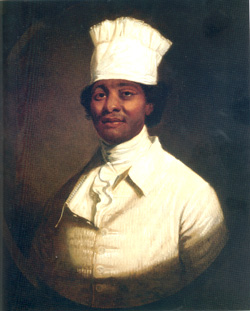Slavery in the President's House
by Edward Lawler, Jr.

Attributed to Gilbert Stuart
The enslavement of Africans and African-Americans was legal in all thirteen of the American Colonies before the Revolutionary War. Slaves were considered valuable property, and some whites had large sums of money invested in them. In 1780, Pennsylvania became the first former colony to take steps to abolish slavery, although the law was a gradual emancipation and freed no one immediately. The children born of a registered Pennsylvania slave mother after the law was enacted would have the legal status of indentured servants until they reached their majority, which was assigned as the age of 28. Children born before law was enacted remained enslaved for the rest of their lives. Thus, legal slavery continued in Pennsylvania until 1847, when the legislature finally abolished it, freeing the hundred or so Africans who remained enslaved.
Washington lived in Philadelphia in the President's House from 1790 to 1797, but he maintained that he remained a resident of Virginia, and that the provisions of the law for a resident of Pennsylvania did not apply to him. He was careful that neither he nor his slaves spent the six continuous months in the state necessary to establish legal residency.
Quaker Philadelphia was a center of abolitionism. Slave-owning delegates to the first and second Continental Congresses and the Constitutional Convention complained of harassment by abolitionists. This antagonism was a key factor in the decision to make the District of Columbia, situated in a region where slavery was accepted, the permanent national capital. The President was aware of public opinion, and gradually replaced the slaves in the Philadelphia household with white German indentured servants.
Washington owned more than a hundred slaves himself, but most of those at Mount Vernon and his other plantations were owned by the estate of his wife's first husband, Daniel Parke Custis, and were called "dower" slaves. The status of a slave child was determined by the status of the mother. Washington freed his own slaves in his will, but the dower slaves were not freed, but divided among Martha Washington's grandchildren at her death.
There were eight enslaved Africans in the household when Washington moved into the President's House in November 1790. Two of them, Oney Judge and Hercules, escaped to freedom from Philadelphia, leaving families behind at Mount Vernon. A ninth enslaved African, Joe (Richardson) was brought to Philadelphia in 1795. It is not known how long he worked in the President's House.




